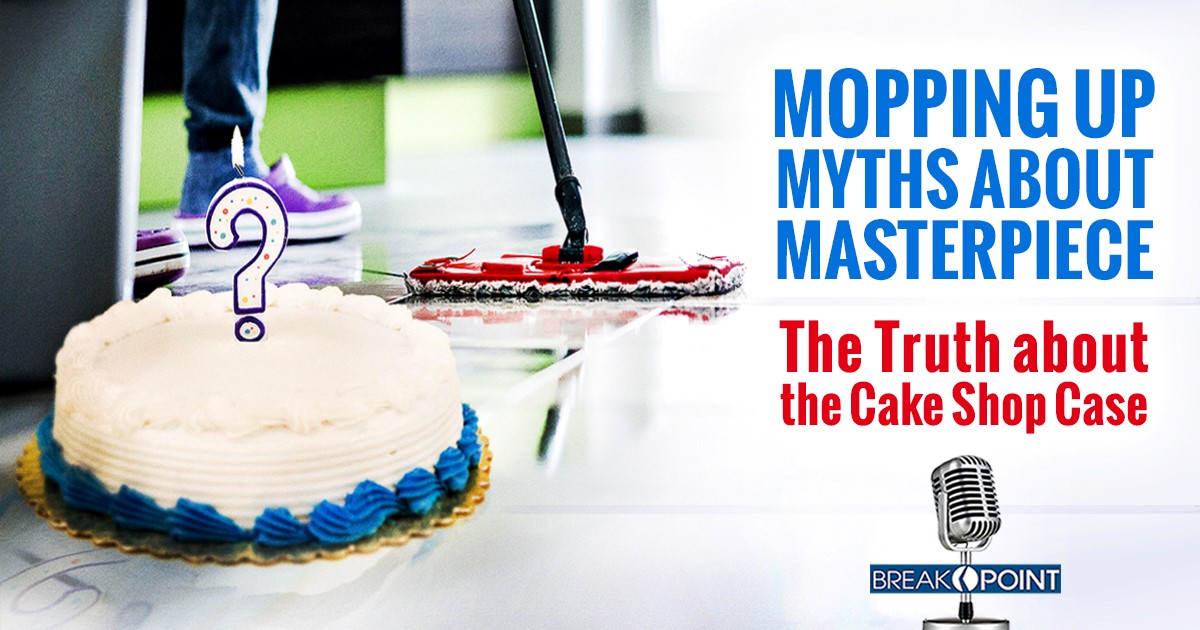

BreakPoint
BreakPoint: Mopping Up Myths about Masterpiece
 With all the misinformation out there about the most important religious freedom ruling of the year, here’s a review of the facts.
After the Masterpiece Cake Shop v. Colorado Civil Rights Commission ruling, a popular progressive Facebook page posted a meme asking whether “gay heart surgeons have the right to refuse to save the lives of bigoted cake shop owners.”
I’m going to say this once, and very clearly: This is absurd.
Since its beginning, the Masterpiece case has been plagued by blatant misrepresentations like this one. It’s especially shameful when Christians repeat them.
The first and worst myth is that Jack Phillips refused to serve gay people. This is a complete falsehood. Jack made it clear that he’s happy to sell his baked goods to gay people who come into his store. What he refuses to do—very politely, I might add—is use his artistic talent to promote a message—the message that gay “marriages” are something we should celebrate.
Why? Because that message violates the deeply held beliefs that Jack has. By the way, so do millions of Americans. That he should be forced by the government to design a cake for a gay wedding is unthinkable.
But that’s not the only myth about his case that just won’t die. Many say that Christians today are using the same biblical arguments against gay “marriage” that were once used to defend slavery and Jim Crow laws in generations past. Again, this is flat out false.
Even Justice Kennedy said, in his majority opinion, that this comparison was not only awful but not true. In fact, Kennedy verbally smacked down the Civil Rights Commission of Colorado for making that comparison.
Now to be clear, America’s shameful history of racism included many Christians. But so-called biblical arguments for racism are and always have been terrible, and are—don’t miss this—uniquely cultural phenomena. You find them in very narrow historical contexts, like in America and South Africa. They’re not consistent throughout Christian history. You can’t find racist arguments across the writings of the Church fathers, or the Reformers, or the major scholars of biblical interpretation and theology.
But that can’t be said of the Christian sexual ethic, which not only dates to the very beginning of the Church and has held constant for two-thousand years among Catholics, Protestants and Orthodox believers alike, but is based on clear, direct teaching in both the Old and New Testaments. The Christian sexual ethic is grounded in the creation narrative and was fully endorsed by Jesus himself.
But the most troubling thing I’ve heard is probably, “Jesus ate with sinners, He would have baked the cake,” and “Jesus didn’t discriminate.”
Now first of all (and I say this respectfully), it doesn’t matter what you think Jesus would have done. The definition of religious freedom is that Jack Phillips and others get to follow their conscience and their sincere beliefs, not yours!
Second, I wonder whether those who use this argument have ever actually read the gospels. Jesus never endorsed sin. He never celebrated something contrary to God’s design. Loving people is distinct from celebrating behavior. When Christ ate with sinners, we know for a fact He wasn’t celebrating their sin. That’s why He said things like, “Go, and sin no more.”
Or, as my friend Bill Jack says, Jesus wasn’t a baker. But he was a carpenter. Do we really think Jesus would’ve made a wedding bed for a same-sex wedding?
Christians understand that homosexual behavior is ultimately the kind of thing that destroys the body and the soul. It’s no more loving to encourage people down this deadly path than it would be to turn away a patient for open heart surgery because of his or her beliefs.
Even though the court decided in Jack’s favor, it’s vital that we lovingly and truthfully counter these myths. This issue is far from settled, and the more people believe these falsehoods, the less likely the next case will go the right way.
Mopping Up Myths about Masterpiece: The Truth about the Cake Shop Case
It's important to know the facts of this case and to be prepared to present the correct version. It's also important to understand what our constitution's guarantee of religious liberty means and how Christians can stand by their beliefs and convictions even in the public marketplace. Check out today's BreakPoint podcast for John's interview with Dr. Robert George on the Masterpiece Cakeshop decision, linked here.
With all the misinformation out there about the most important religious freedom ruling of the year, here’s a review of the facts.
After the Masterpiece Cake Shop v. Colorado Civil Rights Commission ruling, a popular progressive Facebook page posted a meme asking whether “gay heart surgeons have the right to refuse to save the lives of bigoted cake shop owners.”
I’m going to say this once, and very clearly: This is absurd.
Since its beginning, the Masterpiece case has been plagued by blatant misrepresentations like this one. It’s especially shameful when Christians repeat them.
The first and worst myth is that Jack Phillips refused to serve gay people. This is a complete falsehood. Jack made it clear that he’s happy to sell his baked goods to gay people who come into his store. What he refuses to do—very politely, I might add—is use his artistic talent to promote a message—the message that gay “marriages” are something we should celebrate.
Why? Because that message violates the deeply held beliefs that Jack has. By the way, so do millions of Americans. That he should be forced by the government to design a cake for a gay wedding is unthinkable.
But that’s not the only myth about his case that just won’t die. Many say that Christians today are using the same biblical arguments against gay “marriage” that were once used to defend slavery and Jim Crow laws in generations past. Again, this is flat out false.
Even Justice Kennedy said, in his majority opinion, that this comparison was not only awful but not true. In fact, Kennedy verbally smacked down the Civil Rights Commission of Colorado for making that comparison.
Now to be clear, America’s shameful history of racism included many Christians. But so-called biblical arguments for racism are and always have been terrible, and are—don’t miss this—uniquely cultural phenomena. You find them in very narrow historical contexts, like in America and South Africa. They’re not consistent throughout Christian history. You can’t find racist arguments across the writings of the Church fathers, or the Reformers, or the major scholars of biblical interpretation and theology.
But that can’t be said of the Christian sexual ethic, which not only dates to the very beginning of the Church and has held constant for two-thousand years among Catholics, Protestants and Orthodox believers alike, but is based on clear, direct teaching in both the Old and New Testaments. The Christian sexual ethic is grounded in the creation narrative and was fully endorsed by Jesus himself.
But the most troubling thing I’ve heard is probably, “Jesus ate with sinners, He would have baked the cake,” and “Jesus didn’t discriminate.”
Now first of all (and I say this respectfully), it doesn’t matter what you think Jesus would have done. The definition of religious freedom is that Jack Phillips and others get to follow their conscience and their sincere beliefs, not yours!
Second, I wonder whether those who use this argument have ever actually read the gospels. Jesus never endorsed sin. He never celebrated something contrary to God’s design. Loving people is distinct from celebrating behavior. When Christ ate with sinners, we know for a fact He wasn’t celebrating their sin. That’s why He said things like, “Go, and sin no more.”
Or, as my friend Bill Jack says, Jesus wasn’t a baker. But he was a carpenter. Do we really think Jesus would’ve made a wedding bed for a same-sex wedding?
Christians understand that homosexual behavior is ultimately the kind of thing that destroys the body and the soul. It’s no more loving to encourage people down this deadly path than it would be to turn away a patient for open heart surgery because of his or her beliefs.
Even though the court decided in Jack’s favor, it’s vital that we lovingly and truthfully counter these myths. This issue is far from settled, and the more people believe these falsehoods, the less likely the next case will go the right way.
Mopping Up Myths about Masterpiece: The Truth about the Cake Shop Case
It's important to know the facts of this case and to be prepared to present the correct version. It's also important to understand what our constitution's guarantee of religious liberty means and how Christians can stand by their beliefs and convictions even in the public marketplace. Check out today's BreakPoint podcast for John's interview with Dr. Robert George on the Masterpiece Cakeshop decision, linked here.
06/18/18















